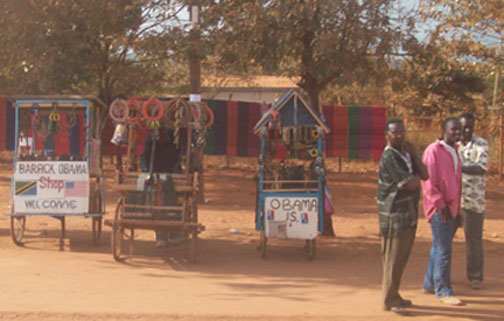
As world leaders gather in New York and Friday’s first debate focuses on international affairs, it is important to keep in mind the overwhelming support that Senator Obama has among the average people around the world. While this might seem irrelevant to some and even a liability to others, to my mind it matters who the global community believes to be best suited to lead our country which has such a dramatic influence on their own. Briallen Hopper at Princeton University just came back from a trip to Tanzania and submitted this essay about the passion that Africans feel about Barack Obama.
Everywhere we went in Tanzania people wanted to talk to us about Obama. At a high school with no running water or internet access, the students were following the campaign avidly. Nasra, a sixteen-year-old student hoping to be an engineer, kept up-to-date with Obama news at an internet cafe. She told me, “I like Obama because of his slogans! Hope! Yes we can! Change you can believe in!” When I asked her why Obama mattered so much to Tanzanians, she said, “We believe that he has to care about Africans, because he has family in Africa.”
Throughout the city of Arusha, walls, doors, and market stalls were covered with newspaper clippings about Obama and hand-written placards in his support. Outside the city, I took a picture of a man selling Maasai beadwork and clothing by the side of the road who had named his stand “The Barack Obama Shop” and decorated it with painted Tanzanian and US flags. Obama fever was equally fervent in other regions of Tanzania. There was an Obama rally when we were in Zanzibar, and the “Maasai for Obama” performed a song written and choreographed in his honor with traditional jumping and chants. A few days after the rally, in the winding streets of Zanzibar’s old Stonetown, a man sat on the steps of his shop and called out to me: “You must pray for Barack Obama! If you do not pray for Barack Obama, you are not a good person!”
It’s strange to see an American politician embraced so enthusiastically by Africans, but it also makes sense that Obama is everywhere in Tanzania. As a man of Kenyan descent, Obama is seen a fellow East African, from a familiar cultural and geographical background. As a black Christian man with both Muslim and Christian family members, Obama may be exotic in America, but he is representative in Tanzania, a country that is approximately 40% Christian and 40% Muslim, nearly 100% black, and characterized by religious tolerance. Obama is East Africa’s “local boy makes good.”
But there is much more to Tanzania’s Obamamania than simple identification. The most memorable moment of the trip for me was during a conversation between our group and Japhet, a Tanzanian ecologist. Japhet had just finished telling us about issues facing Tanzania’s wildlife and agriculture, and we asked him if there was anything else he thought we should know as American students interested in Africa. He said, “Yes, as a matter of fact, there is something that is very important for you to know. In the last two elections, you Americans let down the entire world. Our high fuel prices here, the damage to our tourist economy, the lack of new development, all are effects of the war in Iraq and American policies. And we in Africa don’t just blame George Bush. We are holding accountable the Americans who elected him. As you travel in Africa, as you talk to people and observe what is happening, you must ask yourself: What is my role in what is happening here?”
Tanzanian citizens cannot vote in our election, but they are campaigning for Obama from thousands of miles away because they know November 4th is not just about red states, blue states, and swing states. Our election is global, and as American voters, our role is to be the delegates for the entire world.
